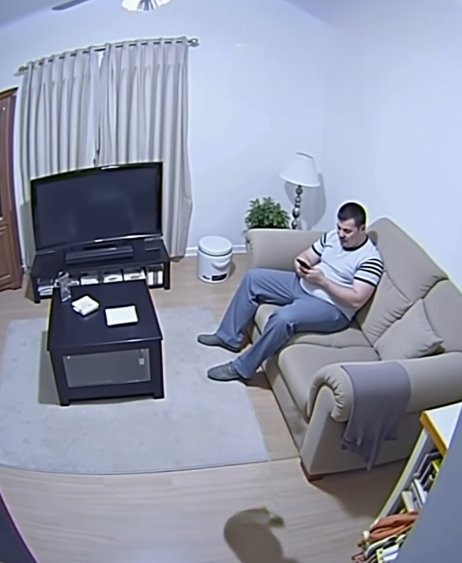Family is often described as the foundation of love, trust, and security. Inside our homes, we expect to find warmth, compassion, and a sense of safety. Parents dedicate themselves to creating an environment where their children feel nurtured and supported, free from unnecessary fear or uncertainty.
But life is not always as simple as we hope. Sometimes, unexpected discoveries test the strength of our bonds and challenge the picture-perfect image we hold of those closest to us.
This is the story of one mother who, through a simple review of a home camera, stumbled upon something she never anticipated. What she saw forced her to rethink her marriage, her role as a parent, and the way forward for her family. While painful, her experience offers lessons for other families navigating stress, communication struggles, and emotional challenges.
When Technology Reveals More Than We Bargained For

Like many parents, I had installed a camera inside our home with the simple goal of keeping everyone safe. I wanted the peace of mind that comes with knowing I could check in when I wasn’t in the room. My intentions were protective — to make sure my daughter was secure, not to uncover something that would shake me to my core.
One ordinary afternoon, I decided to scroll through the recorded footage. I expected to see mundane family moments: perhaps my daughter drawing on the floor, or my husband casually scrolling through his phone. At first, everything appeared normal. But then, the mood shifted.
My husband set his phone aside, and his expression changed. His face hardened, and I could sense a wave of frustration that seemed unusual for him. He approached our daughter with a tone and body language that immediately caught my attention.
My heart pounded as I leaned closer to the screen. What unfolded was not an act of violence, but a moment filled with unnecessary harshness and impatience — something that left our little girl visibly unsettled.
A Child’s Silent Plea
Children may not fully understand the complexities of adult emotions, but they are incredibly sensitive to changes in tone, body language, and energy. Our daughter’s reaction to my husband’s demeanor was heartbreaking.
She looked confused, her small frame stiffening as she instinctively stepped back. Her wide eyes asked a silent question: What did I do wrong?
Rather than calming her with patience or reassurance, his gestures grew sharper. Though he never raised his hand against her, the stern manner and unnecessarily firm grip on her arm were enough to bring tears to her eyes.
Watching this unfold, I felt as if I had been stabbed in the heart. I wanted to rush in, scoop her into my arms, and shield her from even a second of discomfort. But instead, I sat frozen, staring at the screen, grappling with the reality of what I was witnessing.
Reconciling Two Versions of the Same Person
The man in that footage didn’t match the husband I thought I knew. This was the same person who had spent years reading bedtime stories, singing lullabies, and building forts out of blankets. He was the father who once approached every scraped knee with tenderness and every tear with patience.
So why was I seeing such a different side now?
Was it work stress weighing him down? Was he silently struggling with pressures he hadn’t shared with me? Or was there an unresolved frustration slowly bubbling beneath the surface?
The most painful part of watching the video was not just what he did, but the realization that I might not fully understand the emotional world of the man I married.

The Flicker of Regret
To my surprise, the footage also revealed something else: hesitation. After moments of sternness, he would pause. His grip would loosen, his posture would relax, and guilt flickered across his face before he turned back to his phone.
These small glimpses gave me a sliver of hope. Perhaps he wasn’t fully aware of how intimidating he had appeared. Perhaps, deep down, he regretted letting his frustration get the better of him.
Still, those brief pauses didn’t erase the fact that our daughter had felt fear — and that was something I could not ignore.
The Emotional Storm Inside a Mother
That evening, I lay awake, torn between two emotions: anger at my husband for letting frustration spill onto our child, and compassion for the man I knew was capable of kindness and love.
Parenting is not easy. Every mother and father faces moments of exhaustion, impatience, and stress. But there is an important line that should never be crossed: the line between guidance and intimidation.
Children deserve discipline that teaches, not fear that silences.
I realized that if I did nothing, the burden of fear could weigh on my daughter for years. Her sense of safety — the very thing we as parents are meant to protect — would be at risk.
Making a Choice
The discovery left me with three possible paths:
Confront my husband immediately and risk an emotional explosion.
Keep the footage to myself, silently protecting my daughter while ignoring the deeper issue.
Seek help — not just for my daughter’s sake, but for the health of our entire family.
I chose the third option.
Reaching Out for Professional Help
With a trembling voice, I called a family counselor the next morning. It was one of the hardest phone calls I have ever made. Admitting that something was wrong inside our family felt like acknowledging a painful truth I wanted to deny.
But that call was also the first step toward healing.
Counseling offers more than just advice — it provides families with tools to navigate conflict, strategies to express emotions constructively, and guidance for rebuilding broken trust. For us, it created a space where my husband could talk about his frustrations, where I could share my fears, and where our daughter’s needs could remain at the center.
Why Families Face These Challenges
It’s important to recognize that many such situations are not born out of cruelty, but from untreated stress, unresolved trauma, or poor coping mechanisms. Life today places enormous pressure on parents: financial worries, long work hours, societal expectations, and personal insecurities all add layers of tension.
When these pressures go unspoken, they can spill into family interactions in unhealthy ways. That does not excuse harmful behavior, but it highlights why support systems — like counseling, open communication, and community resources — are vital.
Protecting a Child’s Emotional World
Experts often remind us that emotional scars can be just as deep as physical ones. A harsh tone, a frightening gesture, or a lack of comfort can shape a child’s sense of security.
When children grow up in environments where they feel uncertain instead of safe, they may struggle with confidence, trust, and emotional resilience later in life. That’s why it is crucial to intervene early, not only to protect children but also to give parents a chance to grow and learn healthier patterns.
Walking the Road of Healing
The journey forward will not be easy. It requires honesty, vulnerability, and consistent effort from everyone involved.
For my daughter, I am committed to ensuring she feels unconditionally loved, safe, and heard. For my husband, I hold on to hope that with the right support, he can confront the struggles that led him to that moment of frustration. And for myself, I must find the strength to balance compassion with accountability.
We cannot undo what happened, but we can choose how to respond. My dream is that this painful discovery becomes the moment that strengthens us, rather than the crack that breaks us.
Lessons for Other Families
Every household has hidden struggles. Some remain behind closed doors until a small incident brings them to light. What matters is not pretending those struggles don’t exist, but finding the courage to address them.
If you ever sense something is wrong in your home:
Don’t dismiss your instincts.
Prioritize open communication with your partner.
Seek professional help if emotions become overwhelming.
Always, always place the emotional well-being of your children first.
No family is perfect. But perfection is not the goal — growth, healing, and love are.
Conclusion
The day I saw that camera footage was the day my perspective shifted forever. As a mother, I felt heartbreak. As a wife, I felt confusion. But as a family, we were presented with a choice: ignore the cracks or begin the hard work of repairing them.
Love is not just about affection in good times — it is about holding one another accountable, even when it hurts.
This journey is far from over, but I believe in the power of healing. With guidance, empathy, and determination, families can rise from their darkest moments stronger than before.
And if sharing my story encourages even one other parent to seek help, then perhaps my painful discovery can serve a greater purpose.



